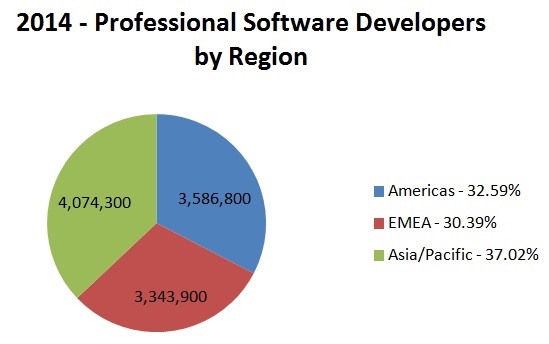Productivity is a measure of the amount of output obtained for a specified input. Software programmers, coders, developers, hackers and productive engineers are in great demand in the corporate arena owing to their technical capability. As for 2014, the number of skilled computer workers and professional software developers globally was estimated to be around 29 million, with Asia Pacific region constituting 37.02% of the total workforce. These technical employees are expensive to employ and they draw in salaries more than the average workers with similar experience and education levels. For companies to sustain in a stiff competitive environment, speed and efficiency of developers and coders matter a lot.
Quite often, it is advisable to utilise one of the tested and effective productivity technique to make sure of increasing IT personnel productivity. It can be a simple one like Pomodoro or a hybrid of several frameworks to boost productivity. Since the top 20% of the people deliver 50% output, hiring those slots and getting rid of the other 80% might help in cost saving for managers. Another theory, ‘The 10X Developer’ theory suggests that the best programmers/ developer are 10 times more efficient than the worst one’s programmers. So identifying a 10X software developer who can draw a salary equivalent to 1X or 2X person might be a deal cracker here. With sprawling cost implication, it becomes crucial to adopt steps to improve the efficiency and productivity of developers in the IT team. Let us have a look into some of the effective tips to increase productivity for coding engineers:
-
Identify Your Zone of Optimum Productivity
For coders and developers, there are certain hours at work with a high level of mental focus and productivity. At this stage, they are able to perform astonishing tasks with optimum mental dexterity and it comes out very spontaneously, something that is unattainable for the remaining hours in their work schedule. Getting into the zone is not as easy as it sounds and can take up to an hour to reach that stage. A research states that after every interruption a programmer takes approx 23 min 15 sec to get back into that zone.
For jobs with sporadic meetings requirements, it goes best to schedule all meetings together to give you a non-meeting time exclusively for your tasks. Emails can be dealt with before or after the ‘zone’ time and instant messaging can be shut off too. For some coders, using headphones works great to screen out background noises. Choose a comfortable workplace to give you sufficient time to think uninterrupted to let ideas flow freely. Basically, any small tactic is worthwhile as long as it is good enough to land you in your zone and deliver optimum coding results.
-
Working Fewer Hours for Higher Productivity
A popular myth that goes with most managers is that working for 10 hours instead of 8 hours result in 125% of the work being done. Not everyone can be as productive as Elon Musk even after working for more than 100 hours a week. Consider how much time does meetings consume? Apart from actually being there, there is also a time demand for preparing for the meetings, getting to and fro from the meeting and so on. Even a prescribed 30 minutes of the meeting can easily consume 60 minutes’ worth of time.
It is suggested that fewer working hours helps in improving productivity. Owing to the time constraint, it helps you to stay more focused and you are inclined towards smarter and breakthrough solutions with ease. Ford introduced 40 hours a week policy in 1922 because they realized that anything over and above the 40 hours is only a slight gain in productivity that tends to decline in three to four weeks. Moreover, time management skills get enhanced. Refer to my earlier article that mentions optimum working hours for sales team for better productivity, to get more insights.
-
Encouraging Physical Well-being
A research suggests back pain is the most common cause of employees’ sickness in the UK with around 16 million people getting affected each year incurring a cost of £5.7 billion to industry each year. Reasons like work-related stress, depression and anxiety account for the second most common reasons costing the UK economy £3.7 to £7 billion each year. Most employees look forward to include physical exercise in their regimen but due to long working hours, lethargy and stress at work, most of them fail to do so.
Companies should encourage employees to start considering physical activity part of the work schedule like dancing, swimming, tennis or any activity of their liking. Google has provided a play area within the campus to encourage its employees to stay fit. General Motors has a special 7-day diet plan for employees to facilitate healthy living. Most Canadians report that regular physical activity improves their ability to cope with and reduce stress by 88% and increase their productivity by 87%. WHO suggests that adults aged 18-64 should indulge in a minimum of 150 minutes of moderate intensity or 75 minutes of vigorous intensive aerobic physical activity in a week. Our mental firepower is directly linked to our physical regimen and fosters faster learning and improved concentration at the workplace, accounting for greater productivity.
-
Praise and Reward
According to a report from Warwick University, happy employees result in 12%- 20% higher productivity and three times more creativity. Google has been ranked as the best company to work with, by Fortune magazine by providing many off-work privileges.
Business feedback has shown that smaller frequent positive feedback and rewards make people happy longer than a single large infrequent happy event, as even the biggest raises ‘wears out’ within a year. When people are happy at work, they become better collaborators and more innovative. It brings a positive influence on people’s moods with small efforts like refreshments, gift cards, extra time off and free lunch. A Genesis Associates report has found out that 85% of workers surveyed felt more motivated during incentive period.
-
Get Proper Project Specifications ahead of Beginning
Every development project involves certain specifications. Having access to incomplete or poor specifications result in work being thrown out or wastage of time as most of the developers’ time goes in seeking clarifications. Only a fraction of a developer’s time is spent writing production code. Most of the time, developers involve themselves in trying different combinations of code until they find the combination of code that works.
Ensure that you and your team receive well-written project specifications and convey all the information that is necessary for successful completion of projects. This would eventually improve your project definition process saving you a tonne of time to focus on development. Developers that plan their code before using the keyboard tend to outperform other developers.
-
Debug at Every Stage
It is a known fact in coding that fixing bugs in released code is way more expensive than fixing them during development. Changing a line or two of code during development phase takes hardly a few minutes. However, for the code to be built, tested, released and deployed to the affected customers along with fixes for data, then the time implication can be really long. Additionally, getting bugs identified at the end of the customer affects the credibility that no coder or business would ever want to.
A simple practice is to run the code in a debugger and use all of the methods. Testing needs to be done for the entire coverage of the code to ensure an error free outcome. However, the more complex a project is, the more it becomes difficult to remove all bugs but a developer must thrive to make his project as error-free as possible and to become more productive.




![12 Ways to Increase Profits of Your Business [2021]](https://www.businessalligators.com/wp-content/uploads/2018/03/girl-working.jpeg)


0 Comments